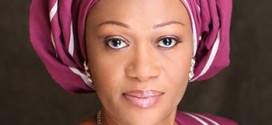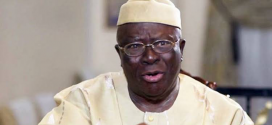 THREE years after some members of his church reported him to authorities for an alleged involvement in a failed “wonder bank”, Ukraine-based Nigerian cleric, Sunday Adelaja is still locked in a battle of wits with the Police in his host country.
THREE years after some members of his church reported him to authorities for an alleged involvement in a failed “wonder bank”, Ukraine-based Nigerian cleric, Sunday Adelaja is still locked in a battle of wits with the Police in his host country.
The members of his church who subscribed to the alleged Wonder Bank scheme lost about N15 billion ($100 million).
Adelaja has been summoned by the Ukrainian Police for another round of questioning on Tuesday, Empowered Newswire reported yesterday.
Some members of the church, “The Embassy of the Blessed Kingdom of God for All Nations, Kiev,” have been in detention since the last two years over the fraud allegation, also called a Ponzi scheme by which depositors are paid huge interests upfront while the bank holds onto the principal for business.
Adelaja pastors Ukraine’s biggest church and one of Europe’s largest.
He told Empowered Newswire that the fresh Police invitation may be a prelude to an arrest and detention and another flank of racial discrimination and religious victimization in the former Soviet country.
He has been having a see-saw battle with Ukrainian Police authorities since 2009.
When the story first broke in 2009, a news medium, modernghana.com reported that the Ukrainian Interior Ministry accused Adelaja of defrauding citizens of money, quoting the ministry’s Department for Media Liaison and International Activity.
The charges were brought under Part 4, Article 190 of the Criminal Code of Ukraine (the embezzlement of funds in very large amounts via fraud),” it quoted the ministry as saying.
Several members of the church were reported to have gone to the Ukrainian authorities to complain that they were unable to recover the money they invested, which left many of them bankrupt.
Police later arrested one of King’s Capital leaders, Aleksandr Bandurchenko, on suspicion of fraud.
Speculation about Adelaja’s involvement with King’s Capital grew after reports surfaced that he was part of a bank in Nigeria known as GS Microfinance Bank Limited.
Adelaja, however, said those accusations are unfounded. He said he had never been involved with King’s Capital but denied that it is a Ponzi scheme, which uses later investments to pay dividends to earlier investors.
He said that King’s Capital was a legitimate business that failed under the pressure of the global financial crisis. He said because the company poured most of the investment capital into real estate, which decreased in value, it had been unable to pay investors.
“When the economic crisis came, all the real estate is no more selling. The land is enough to pay back the money owed. … The problem is … everything is stopped in the country—nothing is selling now in Ukraine,’’ he said.
Adelaja said Interior Affairs Minister Yurii Lutsenko accused the church of involvement because he wants to undermine the evangelical movement in Ukraine. With several thousand members across the nation, God’s Embassy is one of the most influential congregations in Ukraine.
“(Lutsenko) is in a very bad situation,” Adelaja said. “He’s got to prove now that (King’s Capital) is a pyramid scheme, but he cannot.”
Adelaja said he never encouraged his church members to invest in the company and cautioned them to invest in businesses that offer insurance. “Of course … if you invest with insurance you get less percentage,” he said. “What happened was many people said they didn’t need insurance because the (King’s Capital leaders) were Christians.”
He was reported to have acknowledged being affiliated with GS Microfinance, but said he invested his name and influence in the bank, not millions of dollars. He was quoted to have said that GS Microfinance was formed to give small loans to poor Nigerians as a way of lifting them out of poverty.
“It’s not about what you can get, but the vision of the programme is to elevate and get as many people out of poverty as possible,” Adelaja was quoted as saying. “That is one of my lifetime passions … because I grew up in poverty.”
Although Adelaja has repeatedly denied any involvement in King’s Capital, which has not officially been deemed a fraudulent business, Pentecostal and charismatic leaders across Ukraine are calling on him to repent, saying they heard him encourage church members to invest in the company on several occasions.
“He was not a president of this company, but he was the No. 1 spiritual leader, and he told them what they have to do,” said Bishop M. S.Panochko, leader of the All-Ukrainian Union of Pentecostal Churches of Evangelical Faith, which comprises 1,500 churches across the nation.
“He can do everything to tell them that he is not involved, but all the leaders have a lot of facts, and we have a lot of video of when he was pushing people, and he encouraged people to invest in this business.”
Panochko was one of 10 leaders who met with Adelaja in 2009 to confront him about his alleged support of King’s Capital and the negative impact some of his actions have had on the evangelical church in Ukraine.
The Pentecostal bishops, who together represent more than 2,500 congregations, listed seven items of concern and said Adelaja had a pattern of making exaggerated statements. They pointed particularly to his alleged claim that he led the 2004 Orange Revolution and his reports that God’s Embassy has 100,000 members across the nation.
The bishops say those and other statements are untrue.
After the meeting, Adelaja issued a statement saying he did not organize the Orange Revolution, though his congregation participated in the demonstrations. He also asked forgiveness for the negative impact the King’s Capital scandal has had on Ukrainian churches, but he added that he did not personally have any involvement in the company.
Despite the statement, Panochko said the bishops would continue waiting for Adelaja to apologize for allegedly endorsing King’s Capital. If he does not repent, Panochko said the bishops would issue a statement to Christians in Ukraine and abroad, and to the Ukrainian government, denouncing Adelaja and claiming no affiliation with him.
Moscow-based pastor Rick Renner, founder of the Good News Association of Churches and Ministries for Russia, Latvia and Ukraine, said Adelaja’s claims are hurting Christians in the former Soviet Union.
If convicted, Adelaja may spend up to 12 years in imprisonment, according to Part 4, Article 190 of the Criminal Code of Ukraine.
Confirming the invitation by Ukraine’s Internal Affairs Ministry, Adelaja told Empowered Newswire that the case for which he is being summoned is about the collapse of King’s Capital.
The Nigerian born cleric was described last year by the New York Times as one of Ukraine’s “best known public figures”
Another Nigerian young man was recently charged with attempted murder after he reportedly fought to defend himself from the assault of 4 Ukrainian attackers.
Dismissing the allegation as mere political charges that bears no resemblance to fact, Adelaja said “in Ukraine you don’t have to commit a crime before you are accused, you only have to be targetted.”
A well-known Ukrainian lawyer, Andrey Fedur, argues that as far as the law is concerned Adelaja “cannot be punished, for he does not have anything to do with this case. The charges are absolutely made up and have no foundation.”
According to a New York Times report last year, “Adelaja has built a vast religious organization under the banner of his church, Embassy of God. He has become one of Ukraine’s best known public figures,” making him by far a significant leader in the country whose favour politicians have curried in the past causing them to win victories to high public positions.
While Adelaja’s political battle has been on since 2009, the invitation to the state police on Tuesday is seen as a heightening of the case, after some members of the church have been detained for over two years.
Besides the Pastor himself is under constant police surveillance and not allowed to travel out of the country.
A media commentator and Washington DC publisher, Dr. Segun Olanipekun writing on the summoning said alongside Adelaja, five people have been accused in the church and those have been arrested by the police ahead of the new invitation.
According to Olanipekun, “the church fears that this invitation and the deliberate change of the charge to a criminal one are part of the plot to jail the innocent pastor as he is seen to be a threat to the present government.”
The King’s Capital was formed by some members of Adelaja’s church, but amidst the global economic crisis, the investment company failed and many investors lost a big chunk of money. The Ukrainian police is said to be insisting on linking Adelaja to the failure of the company and alleging criminal acts against the company.
In previous interviews with the police, Adelaja said his questioners were always asking if he knew the church members who owned the business and he always answered in the affirmative, explaining that he was the target of the whole investigation.
It is in the same country of Ukraine that a Nigerian student Olaolu Sunkanmi Femi has been detained since last November on charges of attempted murder after he fought to defend himself against white attackers.
Media reports said last November “eyewitness accounts say Olaolu and his friend who were hurled to the ground and racially abused was able to get up and grab hold of a piece of glass from a broken bottle to use in self-defence.”
Quoting Nigerian Embassy officials in Ukraine, reports stated that “it was while he was defending himself that police arrived at the scene and the Nigerian was subsequently arrested and charged with attempted murder of five people,” who were the original assailants.
Commenting on that case, Adelaja said, “tales like that were not uncommon in Ukraine, saying “they used to kill Africans like that in the past.”
Nigerian Embassy staff are said to be involved in the students case, while Adelaja’s travail is also drawing wider international ripples, with many petition drives online fighting the pastor’s cause. In one of such, ipetition.com, and entitled: “Racial and Religious Persecution Against Sunday Adelaja,” the petitioners noted that “this is a textbook case of xenophobia and discrimination on religious ground.”
That petition also noted that the heightening of the offensive against Adelaja may not be unconnected to the forthcoming elections in the country. According to the petition, the current persecution “is a systemic effort to discredit, persecute and incriminate Pastor Sunday Adelaja from his work as the spiritual leader…in order to dissuade votes in favor of the opposition.”
Adelaja, in a telephone conversation with Empowered Newswire acknowledged that there were currently political moves in place trying to negotiate with him.
He said: “They are trying to solve the problem politically, but we can’t go public as yet on the terms, they are afraid the people may back the opposition.”
Since the country’s Orange revolution that spurred it effectively out of communism, Adelaja and his church have become a very critical force in the emergent political landscape of Ukraine. In Kiev, the local Mayor and the city are known to be very friendly with him, while the country’s Attorney-General Mykola Onischyk has been known to speak up for him, defending his rights to innocent presumption until proven guilty.
It is well known in Ukraine that in 2004, members of the church took an active part in the events of the orange revolution, which resulted in Adelaja being declared a persona non-grata to Russia by then President Vladimir Putin, who accused the Nigerian “of being a voice and a herald of western value systems,” in the old USSR, Communist state.
Also in 2007, Victor Yushchenko, the former President of Ukraine reportedly said that Adelaja’s church in Ukraine, “is the biggest threat to its political dominance that it held over the country.”
 Hottestgistnaija.com
Hottestgistnaija.com




